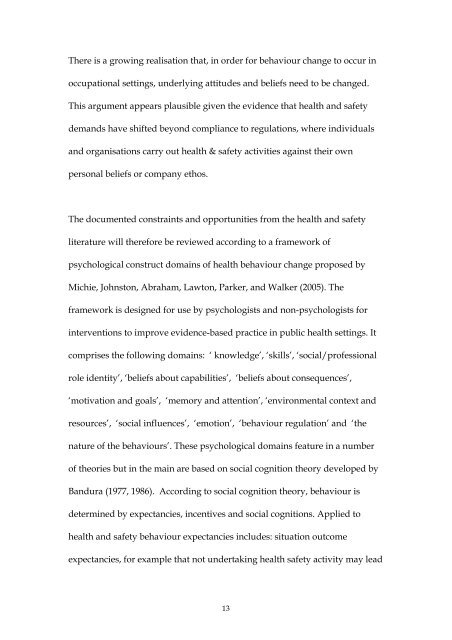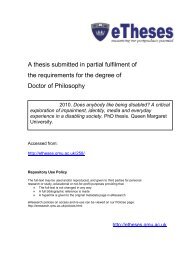PDF (A thesis submitted in partial fulfilment of the requirements for ...
PDF (A thesis submitted in partial fulfilment of the requirements for ...
PDF (A thesis submitted in partial fulfilment of the requirements for ...
You also want an ePaper? Increase the reach of your titles
YUMPU automatically turns print PDFs into web optimized ePapers that Google loves.
There is a grow<strong>in</strong>g realisation that, <strong>in</strong> order <strong>for</strong> behaviour change to occur <strong>in</strong><br />
occupational sett<strong>in</strong>gs, underly<strong>in</strong>g attitudes and beliefs need to be changed.<br />
This argument appears plausible given <strong>the</strong> evidence that health and safety<br />
demands have shifted beyond compliance to regulations, where <strong>in</strong>dividuals<br />
and organisations carry out health & safety activities aga<strong>in</strong>st <strong>the</strong>ir own<br />
personal beliefs or company ethos.<br />
The documented constra<strong>in</strong>ts and opportunities from <strong>the</strong> health and safety<br />
literature will <strong>the</strong>re<strong>for</strong>e be reviewed accord<strong>in</strong>g to a framework <strong>of</strong><br />
psychological construct doma<strong>in</strong>s <strong>of</strong> health behaviour change proposed by<br />
Michie, Johnston, Abraham, Lawton, Parker, and Walker (2005). The<br />
framework is designed <strong>for</strong> use by psychologists and non-psychologists <strong>for</strong><br />
<strong>in</strong>terventions to improve evidence-based practice <strong>in</strong> public health sett<strong>in</strong>gs. It<br />
comprises <strong>the</strong> follow<strong>in</strong>g doma<strong>in</strong>s: ‘ knowledge’, ‘skills’, ‘social/pr<strong>of</strong>essional<br />
role identity’, ‘beliefs about capabilities’, ‘beliefs about consequences’,<br />
‘motivation and goals’, ‘memory and attention’, ‘environmental context and<br />
resources’, ‘social <strong>in</strong>fluences’, ‘emotion’, ‘behaviour regulation’ and ‘<strong>the</strong><br />
nature <strong>of</strong> <strong>the</strong> behaviours’. These psychological doma<strong>in</strong>s feature <strong>in</strong> a number<br />
<strong>of</strong> <strong>the</strong>ories but <strong>in</strong> <strong>the</strong> ma<strong>in</strong> are based on social cognition <strong>the</strong>ory developed by<br />
Bandura (1977, 1986). Accord<strong>in</strong>g to social cognition <strong>the</strong>ory, behaviour is<br />
determ<strong>in</strong>ed by expectancies, <strong>in</strong>centives and social cognitions. Applied to<br />
health and safety behaviour expectancies <strong>in</strong>cludes: situation outcome<br />
expectancies, <strong>for</strong> example that not undertak<strong>in</strong>g health safety activity may lead<br />
13




